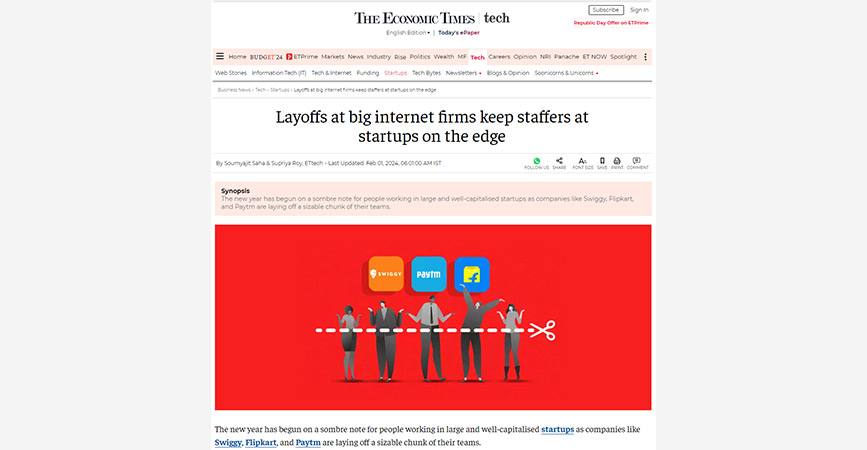
Synopsis: The new year has begun on a sombre note for people working in large and well-capitalised startups as companies like Swiggy, Flipkart, and Paytm are laying off a sizable chunk of their teams.
The new year has begun on a sombre note for people working in large and well-capitalised startups as companies like Swiggy, Flipkart, and Paytm are laying off a sizable chunk of their teams.
This has forced employees and human resources (HR) professionals in the startup ecosystem to realign their expectations for the new year and heightened anxiety among jobseekers.
“We had received good incentives and hikes all through 2022 and 2023,” a rather shocked Flipkart employee impacted by job cuts told ET last week, adding that it felt like a haphazard exit.
The country’s top ecommerce company has initiated a process to reduce its team of 22,000 employees by 5-7%, impacting between 1,100-1,500 people, ET had reported on January 8.
Paytm is letting go of over 1,000 employees and food delivery major Swiggy is preparing to cut 350-400 jobs, ET reported on December 25 and January 26, respectively.
A difficult market
The latest layoffs have injected further anxiety into an already terrible job market that slowed down after the aggressive hiring done by startups in 2021.
“The morale among employees is definitely not upbeat,” a Paytm employee who was laid off last month told ET. “Job security is at an all-time low.”
Over the past few months, those laid off have struggled to find jobs, with some having to take pay cuts and venture into new sectors to land a gig.
In 2023, most job shifts in the startup sector happened at between a 30% salary cut to a 20% salary hike, said Anshuman Das, cofounder and chief executive of both talent solution provider Careernet and executive search firm Longhouse Consulting.
In comparison, most job shifts in 2022 happened at hikes of between 10% to 50%, whereas in 2021, they happened at hikes of between 30% to 80%, Das said.
A person who was laid off by edtech firm Byju’s in July 2023 told ET that it took him five months to find another job. “I guess that was mostly due to the small number of jobs that could be related to my job at Byju’s,” he said on condition of anonymity. “I actually was so fed up with rejections that I didn’t ask for a big hike,” added the person who is now working with a legacy mid-sized software services company.
Another person who was laid off by hyperlocal delivery firm Dunzo in January 2023 said he took three months to find the next job, but was able to stick to the quick commerce and food delivery sector. “Luckily, the other firms (like Swiggy and Zepto) were still expanding, and needed more people with operations experience,” he told ET, requesting not to be identified.
Those that survived multiple rounds of layoffs are not much better off in firms like Dunzo.
In July last year, the beleaguered firm capped June salaries of all its employees at Rs 75,000 irrespective of roles, and withheld their July salaries for months, a former Dunzo employee who exited the firm towards the end of 2023 said. “Towards the end, most of us remaining were as distressed as those laid off because our salaries had been irregular for so long,” the person said.
Need for awareness
In times like these, employees need to get better at understanding how startups at various growth stages act and what kind of risks are attached to working in the sector, said Sanam Rawal, founding partner at talent advisory firm MetaMorph.
“The issue is also that it is very hard for employees to get this kind of information… Founders and investors like to keep strategy and cash burn numbers very close to their chest, so employees in most startups don’t have a good idea of how their firm is doing, or how their role might be impacted in the near future,” Rawal told ET.
The job market meanwhile has got adjusted to such mass layoffs and, as a result, getting laid off is not as much of a taboo as it was before, he added.
Das of Careernet said jobseekers will have to look beyond the attractive salaries offered by startups and start to join workplaces for more “intrinsic reasons”.
A new kind of layoffs
In 2023, most layoffs were conducted by firms trying to scale down and shift away from the growth-at-all-costs strategy amid a funding crunch. The latest layoffs, however, are more focused on cost cutting and not due to a dearth of funding, as these large firms are well-capitalised, said Harold D’Souza, cofounder and director at WalkWater Talent Advisors.
“Firms like Flipkart and Swiggy are instead acting like traditional big tech firms trying to control costs in a negative environment,” he said. “I wouldn’t read this as a proxy of the startup ecosystem necessarily as these firms are now too large and mature to be considered startups (sic).”
Das said a lot of the current layoffs are also a correction from the inflated salaries and benefits at which startup hiring had happened over the past few years.
A senior executive at a large, growth-stage startup that laid off some employees said the senior management is looking to re-hire for a lot of these roles at lower salaries.
Source: The Economic Times








